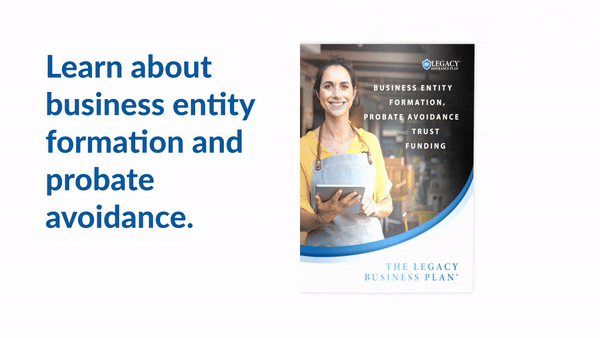Inheriting business assets, such as ownership in a family business, partnership interests or corporate shares, can be a complex and potentially risky endeavor. From estate taxes and inheritance taxes to business succession planning and legal disputes, there are numerous challenges that beneficiaries may face when inheriting business assets. In this article, we'll explore the various risks associated with inheriting business assets and provide strategies for mitigating those risks.
What are the tax implications of inheriting business assets?
One of the most significant risks associated with inheriting business assets is the potential tax burden. Depending on the value of the assets and the structure of the business, beneficiaries may be subject to various types of taxes, including:
Estate taxes
If the total value of the deceased's estate exceeds the federal estate tax exemption ($13.61 million for individuals and $27.22 million for married couples in 2024), the estate may be subject to federal estate taxes. Some states also impose their own estate taxes, which may have lower exemption thresholds. Estate taxes are generally paid by the estate before the distribution of assets to beneficiaries.

Inheritance taxes
Unlike estate taxes, inheritance taxes are imposed on the beneficiaries who receive the assets. As of 2024, only six states (Iowa, Kentucky, Maryland, Nebraska, New Jersey and Pennsylvania) impose an inheritance tax. Tax rates and exemptions vary by state and the relationship between the deceased and the beneficiary.
Capital gains taxes
When inheriting business assets, beneficiaries generally receive a "stepped-up basis," meaning the assets' cost basis is adjusted to their fair market value at the time of the original owner's death. This can help minimize capital gains taxes if the beneficiary decides to sell the assets in the future. However, if the business assets continue to appreciate after the inheritance, the beneficiary may face capital gains taxes on any subsequent sale.
To mitigate the tax risks associated with inheriting business assets, beneficiaries should:
- Consult with a financial professional to understand their specific tax obligations and develop a strategy for minimizing their tax liability.
- Consider the use of trusts, such as a qualified terminable interest property (QTIP) trust or a grantor retained annuity trust (GRAT), to help reduce estate taxes and provide more control over the distribution of assets.
- Evaluate the potential benefits of a Section 6166 election, which allows the estate to defer and pay estate taxes attributable to a closely held business over an extended period.
How can you manage the legal risks of inheriting business assets?

Inheriting business assets can also expose beneficiaries to various legal risks, including:
Business succession disputes
If the deceased's estate plan is unclear or contested, beneficiaries may face legal challenges from other family members or business partners regarding the ownership and control of the business assets. These disputes can be costly, time-consuming and emotionally draining for all parties involved.
Contractual obligations
Inherited business assets may come with existing contractual obligations, such as leases, loans or vendor agreements. Beneficiaries must be prepared to assume these obligations or negotiate new terms with the relevant parties.
Environmental liabilities
If the inherited business assets include real estate or industrial properties, beneficiaries may be exposed to environmental liabilities related to contamination or non-compliance with regulations. These liabilities can be costly to remediate and may impact the value of the assets.
To manage the legal risks of inheriting business assets, beneficiaries should:
- Work with an experienced estate planning attorney to ensure that the deceased's estate plan is clear, comprehensive and legally enforceable.
- Consider the use of a buy-sell agreement or other business succession tools to help prevent disputes and ensure a smooth transition of ownership.
- Conduct thorough due diligence on the inherited business assets to identify any potential legal or financial liabilities.
- Consult with legal professionals to understand their rights and obligations as the new owners of the business assets.
What are the challenges of managing inherited business assets?

In addition to the tax and legal risks, inheriting business assets can present significant management challenges for beneficiaries, particularly if they lack experience in running a business. Some of these challenges include:
Continuity of operations
Beneficiaries who inherit business assets may face pressure to maintain continuity of operations and preserve the legacy of the deceased owner. This can be especially challenging if the beneficiaries have limited knowledge of the business or if key employees or partners decide to leave after the ownership transition.
Conflicting visions and goals
If multiple beneficiaries inherit ownership stakes in the business, they may have conflicting visions and goals for the future of the company. These disagreements can lead to management deadlock, reduced efficiency and potential legal disputes.
Liquidity constraints
Inheriting illiquid business assets, such as partnership interests or closely held stock, can create financial challenges for beneficiaries who may need access to cash for personal expenses or tax obligations. In some cases, beneficiaries may be forced to sell their ownership stakes at a discount or borrow against the assets to generate liquidity.
To address the management challenges of inherited business assets, beneficiaries should:
- Develop a clear and comprehensive business succession plan that outlines the roles, responsibilities and decision-making processes for the new owners.
- Foster open communication and collaboration among co-owners to ensure alignment of goals and minimize the risk of conflicts.
- Consider engaging a professional business consultant to help navigate the transition and provide objective guidance on management decisions.
- Explore options for generating liquidity, such as selling non-core assets, implementing a dividend policy or establishing a buy-sell agreement with other owners.
How can you protect your inherited business assets?

To safeguard inherited business assets and ensure their long-term viability, beneficiaries should take proactive steps to manage risks and protect their interests. Some key strategies include:
Implementing a robust risk management plan
Develop a comprehensive risk management plan that identifies potential threats to the business, such as market volatility, competition or cybersecurity risks and outlines strategies for mitigating those risks. This may include purchasing insurance policies, diversifying investments or implementing crisis management protocols.
Maintaining accurate and transparent financial records
Ensure that the business maintains accurate and transparent financial records, including regular financial statements, tax filings and audit reports. This can help prevent financial mismanagement, detect potential fraud and provide a clear picture of the business' financial health.
Investing in professional development and succession planning
Encourage ongoing professional development and training for key employees and managers to ensure that the business has a strong pipeline of talent and can weather leadership transitions. Develop a formal succession planning process to identify and groom potential future leaders.
Building strong relationships with key stakeholders
Foster strong relationships with key stakeholders, such as customers, suppliers, lenders and community partners. These relationships can provide a foundation of support and stability during times of transition or uncertainty.
Conclusion
Inheriting business assets can be a complex and potentially risky endeavor, with significant tax implications, legal issues and management challenges. However, by understanding these risks and implementing proactive strategies to mitigate them, beneficiaries can successfully navigate the inheritance process and preserve the value of their inherited assets.
Beneficiaries should work closely with experienced legal, tax and financial professionals to develop a comprehensive plan for managing their inherited business assets. This may include implementing tax-efficient estate planning strategies, establishing clear business succession plans and maintaining robust risk management and financial oversight practices.
By taking a proactive and informed approach to inheriting business assets, beneficiaries can honor the legacy of the deceased owner, protect their own financial interests and ensure the long-term success and viability of the business. While the challenges of inheriting business assets can be significant, with careful planning and expert guidance, beneficiaries can transform this complex undertaking into a valuable opportunity for growth and prosperity.



